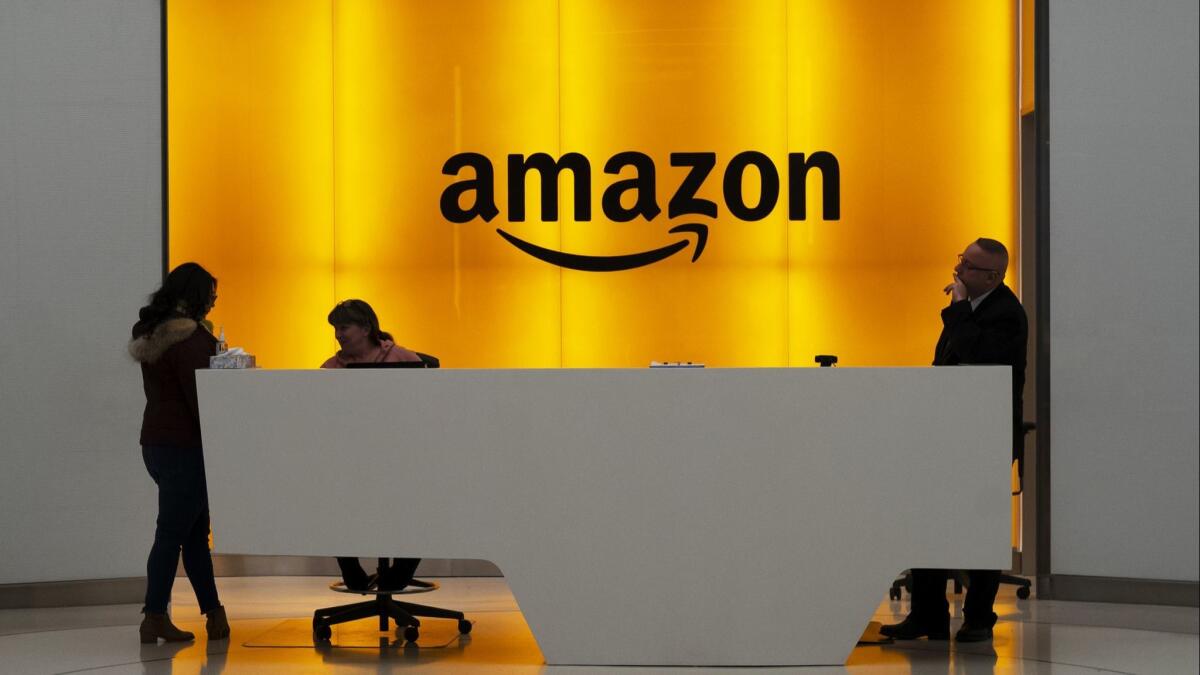Editorial: Small retailers who sold through Amazon are facing a tax time bomb

- Share via
Online sales have taken over a growing percentage of the U.S. retail market, accounting for about $1 out of every $7 spent by consumers. But through much of that rise, online sellers had an unfair advantage over brick-and-mortar retailers: They weren’t compelled to collect sales taxes from consumers in states where they had no offices. That’s because the Supreme Court had exempted mail-order companies decades ago from collecting out-of-state sales taxes.
That all changed last year. In South Dakota vs. Wayfair, the justices reversed their position and held that states could indeed compel out-of-state online retailers to collect sales taxes from in-state buyers. The court wisely recognized that the older rulings were distorting the retail market, to the disadvantage of local shops and local governments that relied on sales taxes.
California responded with a new law last month (Assembly Bill 147) that requires retailers to collect sales taxes from buyers in California even if the companies have no physical presence in the state. And to help smaller out-of-state businesses that sell their goods on the platforms provided by Amazon and other big e-commerce companies, AB 147 requires the platform operators to collect taxes on behalf of third-party retailers.
As unfair as it may have been for out-of-state retailers to avoid the sales tax burden, they were playing by the rules of the day.
That’s appropriate, given that many of these smaller online retailers are sellers in name only — they rely on the likes of Amazon to store, market, sell, ship and handle returns of their goods. And besides, it’s simple enough for Amazon and its ilk to collect the taxes — they’re already set up to do so wherever they have offices, which in Amazon’s case is practically every state in the union.
But state tax officials aren’t looking just to Amazon for more sales-tax revenue. Instead, the California Department of Tax and Fee Administration has been seeking years of back taxes, with penalties and interest, from small out-of-state businesses that sold products through Amazon’s “Fulfilled by Amazon” program to shoppers in California. For example, a 12-person company in Michigan that sells comfort shoes and orthotic inserts online is facing a $200,000 bill for three years of back taxes, penalties and interest. A mom-and-pop kitchenware supplier is facing a bill for more than $100,000.
As unfair as it may have been for out-of-state retailers to avoid the sales tax burden, they were playing by the rules of the day. To demand back taxes now seems every bit as unfair.
In the years leading up to the Wayfair ruling, states across the country and Congress tried again and again to come up with a sales-tax regime for online retailers, to no avail. So out-of-state companies had reason to believe that they were under no obligation to collect taxes from California shoppers. In fact, the state enacted a law in 2011 exempting online retailers from having to collect sales taxes here unless they maintained warehouses or showrooms in the state.
Amazon started having to collect sales taxes on the products it sold to Californians when the company opened a “fulfillment center” in San Bernardino in 2012, its first warehouse in California. The company didn’t automatically collect taxes on the goods it sold on behalf of third parties, however; it left that decision to those smaller retailers.
Enter the Fray: First takes on the news of the minute »
But the Department of Tax and Fee Administration argues that under long-standing state law, merely having a product for sale in an Amazon warehouse in California was enough to trigger an obligation to collect sales taxes from California consumers — even if the item wasn’t in fact sold from within the state. Nor does it matter to the department that Amazon unilaterally decides where to store goods from third-party sellers, and it can move products into California without the third-party seller’s approval or advance knowledge.
This is a “gotcha” approach to tax collection, and given national debate and widespread uncertainty over the rules for sales taxes, it’s wholly inappropriate. The department says sellers can go back to their former customers and try to recover the sales taxes now due, but that’s unrealistic to the point of absurdity.
State Treasurer Fiona Ma argues that the state shouldn’t be going after small businesses that seized the opportunity that Amazon and other online platforms presented. She’s right. The obligations for Amazon and other out-of-state retailers are clear now, but they weren’t before AB 147. Gov. Gavin Newsom should order the Department of Tax and Fee Administration to stop pursuing back taxes and focus instead on strong enforcement going forward.
Follow the Opinion section on Twitter @latimesopinionand Facebook
More to Read
A cure for the common opinion
Get thought-provoking perspectives with our weekly newsletter.
You may occasionally receive promotional content from the Los Angeles Times.









